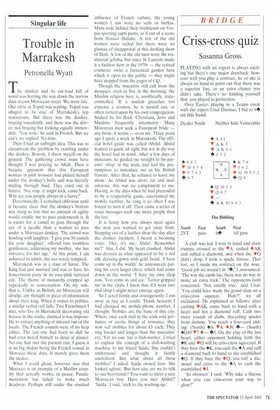Singular life
Trouble in Marrakesh
Petronelia Wyatt
The donkey and its car-load full of wood was barring the way down the narrow dust-strewn Moroccan street. We were late. Our table at Topsil was waiting. Topsil was alleged to be one of Marrakesh's top restaurants. But there was the donkey, braying truculently, and there was the driver, not braying but looking equally immovable. You wait,' he said in French. But we can't, we replied. No time,
Then l had an unbright idea. This was to circumvent the problem by crawling under the donkey. Bravely, I threw myself on the ground. The gathering crowd must have thought I was praying to Allah. Then it became apparent that this European woman in pink trousers had placed herself under the donkey's belly and was literally wading through mud. They cried out in horror. 'No, stop. it might kick, come back. Why are you people always in a hurry?'
Determinedly, I remained oblivious until it became clear that the donkey's bottom was slung so low that no amount of agility would enable me to pass underneath it. It is easier for a camel to pass through the eye of a needle than a woman to pass under a Moroccan donkey. The crowd was howling with laughter. 'I give you 50 camels for your daughter,' offered one toothless gentleman, addressing my mother, 'she has initiative for her age.' At this point, I am ashamed to admit, she was sorely tempted.
Marrakesh was in a state of havoc. The King had just married and was to have his honeymoon party in its rose-pink turreted city. The theme of monarchy cropped up repeatedly in conversation. On my side, that is. Unlike us British, no Moroccan will divulge any thought or piece of information about their king. When it comes to politics, a similar verbal veil falls. Two Frenchmen I met, who live in Marrakesh decorating old houses in the souks, claimed it was impossible to extract anything of interest out of the locals. The French consuls were of no help either. The last one had been so dull he had even bored himself to sleep at dinner. No one had met the present one. I guess it is no big shakes being the French consul in Morocco these days. It merely gives them the shakes.
What I could glean, however, was that Morocco is an example of a Muslim country that actually works, in peace. Fundamentalism has failed to make much headway. Perhaps still under the residual
Influence of French culture, the young women I saw wore no veils or burkas. Many rode behind their boyfriends on Vespas sporting capri pants, as if out of a scene from Roman Holiday. A few of the old women were veiled but there were no glances of disapproval at this dashing show of flesh. A few of the old men wore the traditional jellaba, but since St Laurent made it a fashion item in the 1970s — the retired couturier owns a fantastical garden here which is open to the public — they might have stepped from the pages of GQ.
Though the muezzins still call from the mosques, even at five in the morning, the Muslim religion here is, unofficially, statecontrolled. If a mullah preaches too extreme a sermon, he is turned out, or often turned upon by his own congregation. Socked by his flock. Christians, Jews and Muslims frequently intermarry. Many Moroccan men seek a European bride — any bride, it seems — even me. Three years ago I spent a week in Marrakesh. The official hotel guide was called Abdul. Abdul wanted to guide all right, but not in the way the hotel had in mind. After a few days of museums, he guided me straight to his parents shop' in the souk, and had the presumption to introduce me as his British fiancée. After that, he refused to leave me alone. As Abdul was short, fat and malodorous, this was no compliment to me. Having, in the days when he had pretended to be a respectable guide, ascertained my mobile number, he rang it so often I was forced to turn it off. Then came a series of voice messages each one more purple than the last.
It is funny how you always meet again the man you wanted to get away from. Stepping out of a leather shop the day after the donkey incident, I heard a booming voice. 'Hey, it's me, Abdul. Remember me?' Alas, I did. My heart crashed. Abdul was dressed in what appeared to be a red silk dressing-gown with gold braid. 'I have come up in the world,' he announced, patting his even larger chest, which had come down in the world. 'I have my own shop now. You come in and see.' Terror gripped me in the vitals. I knew that if I went into that shop I might never emerge again.
So I acted firmly and courageously: I ran away as fast as I could. Thank heavens I had changed my mobile-phone number, I thought. Mobiles are the bane of this city. Where once each stall in the souk sold perfumes or exotic things of romance, they now sell mobiles for about /3 each. They ring louder and longer than the muezzins' cry. Yet no one has a dish-washer. I tried to explain the concept of a dish-washing machine to my friend Saida. She couldn't understand and thought it faintly uncivilised. But what about all these mobiles? I asked. Saida owned four. She looked aghast. 'But how else are we to talk to our boyfriends? You want to meet a nice Moroccan boy. Have you met Abdul?' 'Saida,' I said, 'stick to the washing-up.'


















































































 Previous page
Previous page